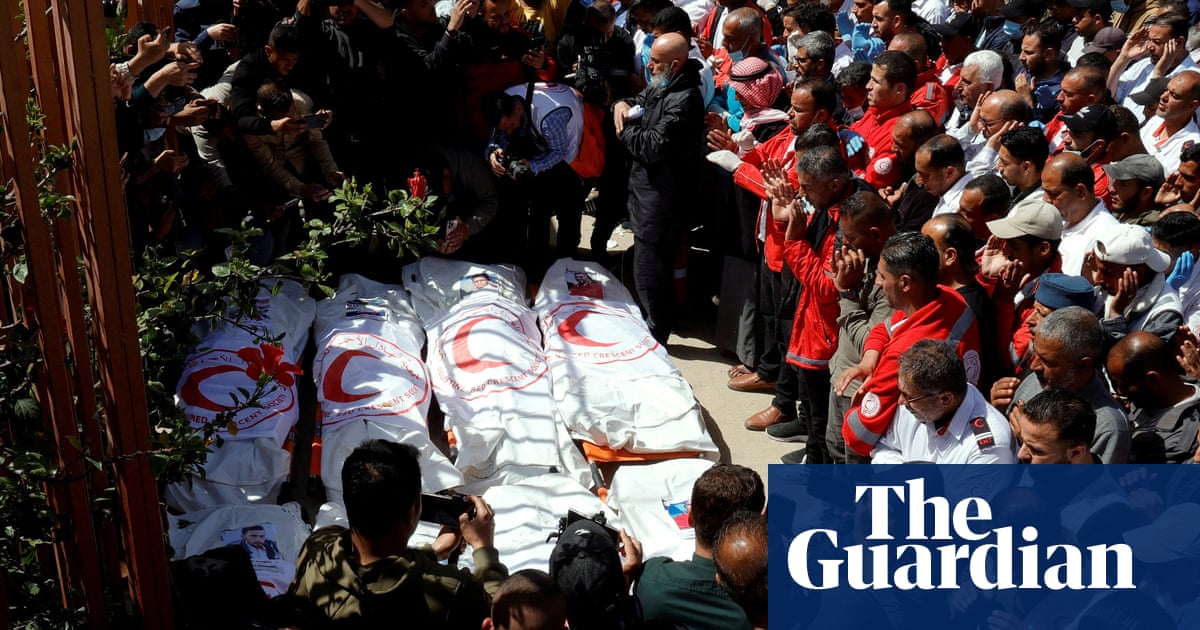Anxious and wildfire-weary Angelenos can expect a break in the extreme winds that have been fanning the flames destroying the region. And while welcome, the reprieve may be short-lived, the National Weather Service (NWS) said in a social media post Wednesday afternoon.
“Next week is a concern. While confident that we will NOT see a repeat of last week, dangerous fire weather conditions are expected,” the agency said.
Santa Ana winds on Monday and Tuesday will increase the chances of yet another red flag warning being issued, the NWS added.
Though the anticipated Santa Ana winds did not undo the week’s worth of progress fire crews made in the Palisades and Eaton fires, the blazes continue to tear through parts of Los Angeles county. So far the two largest fires have killed at least 25 people, burned over 40,000 acres and destroyed thousands of homes, places of worship and schools.
The National Weather Service issued the most extreme level of a red flag fire warningof a “particularly dangerous situation” in Los Angeles and Ventura counties.
“The danger has not yet passed,” said the Los Angeles fire department chief, Kristin Crowley, during a Wednesday news conference. “So please prioritize your safety.”
Officials in San Bernardino county, just north-east of Los Angeles, reported that a new fire ignited on Wednesday afternoon, but firefighters successfully contained it to 34 acres. The county fire department confirmed there was no damage to structures and no reported injuries. The cause of the blaze remains under investigation.
The deadly Palisades fire in the western suburbs of Los Angeles – the largest of the four wildfires – was still only 19% contained on Wednesday morning, more than a week after it ignited, and has destroyed thousands of properties and killed residents. But the Eaton fire, the next largest fire, in the Altadena area in north-eastern LA county, is now 45% contained – up 10% from Tuesday – with 14,100 acres burned. Officials said the Eaton fire is expected to stay within its existing footprint.
The shroud of noxious gray smoke had begun to lift over the region, but health officials warned that wind borne ash particles remained a danger, and urged residents to wear N95 or P100 masks. Ash particles cannot be detected by standard air monitoring instruments, and may not reflect in Air Quality index Levels.
Firefighters were also struggling to put out two smaller fires, the persistent Hurst fire in north Los Angeles and the newer Auto fire, in Ventura county.
As of Tuesday, 88,000 people remained under evacuation orders, with another 84,000 at risk of being placed under new orders should the fires spread. Officials raised the official death toll on Tuesday to 25 people – 18 from the Eaton fires and seven from the Palisades fire. That number is expected to rise as crews strive to reach some of the burnt wreckage across many square miles, with huge swaths still ablaze.
The fierce Santa Ana winds were expected to subside by Thursday, but the parched region is expected to remain in peril, with no significant chances of rain through 25 January, according to forecasters.
The last significant rain in Los Angeles was in early May last year, when the city’s downtown saw just 0.13in of rain, according to the Los Angeles Times. The lack of moisture in the area, along with the winds, is a recipe for dangerous wildfire conditions.
“Any kind of red flag warning is dangerous. But there’s a gradient even within that range of situations, and so we wanted a way to message the extreme of the extremes. And the [‘particularly dangerous situation’ warning] is what came from that,” the meteorologist Ryan Kittell told the LA Times.
Brief respite came on Tuesday, when winds were much tamer than what had been forecast, allowing firefighters to push forward efforts to contain the Palisades and Eaton fires. The weather service’s “particularly dangerous situation” red flag warning expired on Wednesday afternoon. But forecasts say that extreme winds of 50mph to 70mph are possible in parts of Los Angeles and Ventura county until Wednesday night.
Estimates put economic losses due to the fire at between $250bn and $270bn, making it the costliest fire disaster in American history. Los Angeles mayor Karen Bass said she did not know a timeline for rebuilding.
“We are one city. We stand together,” she said. “The city and the county will do everything we can to expedite the rebuilding.”
Erik Scott, fire captain of the LA fire department, told the LA Times on Tuesday that the wildfires are “the most devastating natural disaster to hit the Los Angeles area”.
“I’ve worked here for 20 years and I’ve never seen nor imagined devastation to be this extensive,” he said.
On Tuesday, Southern California Edison, the area’s largest electricity provider, shut off power for over 58,000 customers in Los Angeles and Ventura counties on Tuesday. The utility said more than 200,000 more customers could see their power shut off on Wednesday in anticipation of extreme winds.
The electricity provider has been under scrutiny in recent days as multiple lawsuits were filed against the company. Residents and business owners in neighborhoods close to the Eaton fire said they saw the base of a transmission tower on fire before the Eaton fire started.
The company has said it has received evidence preservation notices from insurance companies and noted that analysis of electrical circuit information showed no interruptions or anomalies around the time that the fire started.

 3 months ago
45
3 months ago
45













































